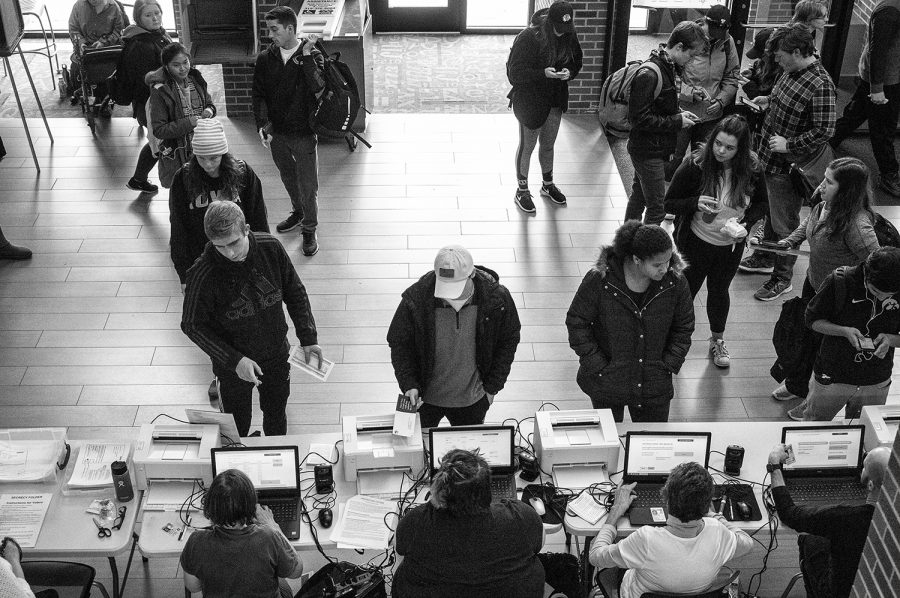Bill could kill satellite voting at UI, decrease access to polls for students
A broad bill would make changes to the conduct of elections in Iowa, including a provision would prevent state-owned buildings from being early voting stations, including the IMU and the UI hospital.
Voters wait to vote at the University of Iowa Library.
March 8, 2019
Buildings on Iowa’s three university campuses may be off-limits for future satellite voting locations under a proposal in the Iowa Senate, which cleared a key legislative deadline Thursday.
Some counties in Iowa, including Johnson, Story, and Black Hawk, which are home to Iowa’s three regent universities — the University of Iowa, Iowa State University, and the University of Northern Iowa — set up stations across the county where voters can cast absentee ballots in person before Election Day. In total, there were six satellite locations across the three campuses with one at ISU, two at the UI, and three at UNI. Kirkwood Community College in Iowa City also had a location.
Senate Study Bill 1241 would prohibit a county from holding a satellite voting location in “state-owned building,” including at state universities. One exception in the bill is made for county courthouses. There is disagreement whether the bill’s language extends to community colleges, said Sen. Tony Bisignano, D-Des Moines, the ranking member of the committee that is considering the bill.
The bill passed the Senate State Government Committee 10-5 along party lines, clearing a key legislative deadline, the March 8 funnel.
The bill would also require students graduating from one of the three regent universities to fill out a form and indicate whether they will live in Iowa after they graduate. If the soon-to-be graduate ticks no, their data would be removed from the voter-registration system.
Sen. Roby Smith, R-Davenport, did not return The Daily Iowan’s calls by the time of publication, though he has said that the goal of the bill is to make elections rules and regulations more consistent.
No lobbyists are registered in support of the bill, but the League of Women Voters, the American Civil Liberties Union of Iowa, the Iowa Association of County Auditors, and the Iowa Association of Counties are all registered against the bill.
Johnson County Auditor Travis Weipert said the bill would have an effect on voter turnout in the next election as more people would have to vote at their precinct location or a less convenient satellite polling place.
“It’s a terrible idea,” Weipert said. “The Iowa Constitution and the U.S. Constitution gives us the right to vote, and here we are limiting government property for voting purposes.”
On the UI campus, there were two satellite locations during the 2018 midterm election: the IMU and the UIHC. Weipert said those locations were convenient for students, employees, and community members.
During a three-day period before the 2018 election, the UIHC satellite location had 1,302 ballots cast and 982 ballots submitted in the IMU. The Kirkwood location had 106 ballots cast in one day, according to data from the Johnson County Auditor’s Office.
“I don’t know why the state government would want to restrict facilities from being satellite voting locations,” Weipert said. “It just makes absolutely no sense.”
Black Hawk County Auditor Grant Veeder wrote in an email to The Daily Iowan that the three satellite voting sites on campus have become a significant part of student voter turnout, with 989 ballots cast among those sites during the 2018 election.
He also noted that the Iowa Code says public buildings supported by taxation are to be given first consideration for Election Day polling locations.
“The language of SSB 1241 prohibiting satellite voting in state-owned buildings, while not in direct contradiction of this statute, certainly violates its spirit,” Veeder wrote.
Bisignano called the entire bill “mean spirited.”
He noted that while his first thought was of regent universities, he believes the bill will make it more difficult for veterans and people in rural areas as well.
Other provisions included in the bill:
• Closes polls at 8 p.m. instead of 9 p.m.
• Requires elections commissioners to use an electronic poll book by 2020
• Makes optional a current requirement for the Iowa Secretary of State’s Office to notify the public of a proposed constitutional amendment through publishing in a newspaper.
• Requires bond measures to include property-tax information, such as whether taxes will be increased or decreased.
















